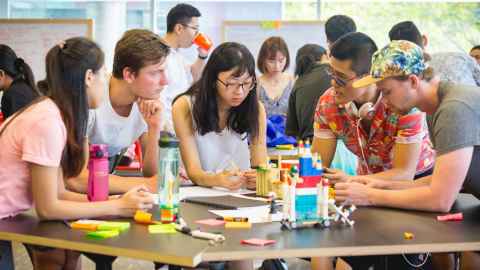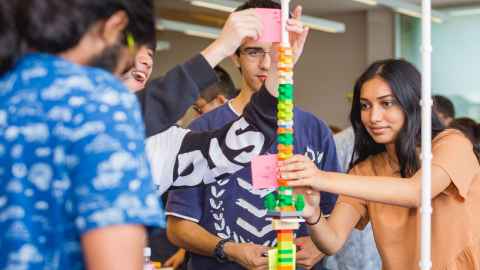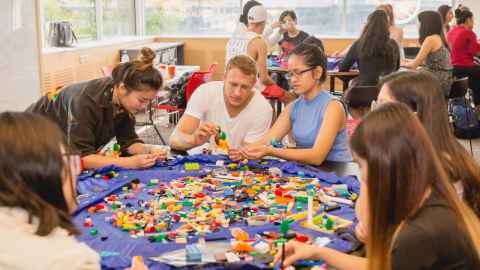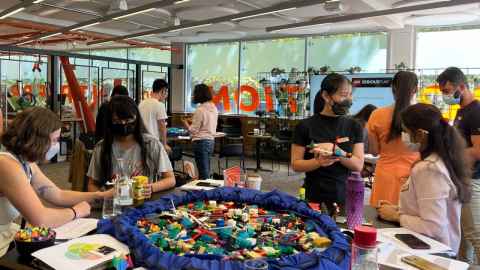The rise of LEGO play as a university teaching tool
19 October 2022
LEGO® Serious Play®(LSP), developed by Swiss professors in the 1990s, is being used extensively for workshops at the Business School's Centre for Innovation and Entrepreneurship (CIE).

LEGO® is being increasingly adopted at the University of Auckland as a teaching tool by educators looking to find new ways to engage with students who want active rather than passive learning experiences.
The Business School’s Centre for Innovation and Entrepreneurship (CIE) has become a champion of the technique, with sessions delivered at Unleash Space, one of its innovation hubs.
LEGO® Serious Play® (LSP) is a facilitation methodology that was developed by Swiss professors in the 1990s. LSP involves collaborative workshops where participants create three-dimensional models of ideas and concepts with the intention of improving communication and creativity. It is now an established methodology to solve problems, improve decision-making and harvest collective innovation in organisational settings.
In 2017, the Business School hired a facilitator to train 19 University of Auckland staff to become LSP facilitators. In 2018, with support from the Hynds Foundation, Doug Sparkes from the University of Waterloo visited New Zealand to deliver further training.

Professor of Entrepreneurship and CIE Academic Director Rod McNaughton, who used to work with Sparkes at Waterloo, says, “Doug developed a multi-day simulation of the entrepreneurial process using Lego. In the simulation course, teams had to ‘tender’ for a project of building a rover to land on Mars.
"Teams designed robots, priced the designs, dealt with last-minute changes to the scope, managed client relationships and built alliances with other teams.”
LSP continues to be used by CIE for a variety of initiatives such as a recent workshop run for the Science Scholars programme and used in Summer Lab, the month-long venture development programme that uses the United Nations Sustainable Development Goals as a teaching framework.
Director of CIE Darsel Keane says, “We run a number of high-tech programmes. However, LSP is fantastic for things like ideation workshops specifically because it is low-fi, inclusive and accessible.
"For workshops such as university preparation programme UniBound, it helps to make a first experience on university grounds less intimidating for young people who are outside of their comfort zone. For situations such as our doctoral entrepreneurial leadership programme or work with academics and professionals, it helps to make people less guarded and open up a more experimental mindset.”

LSP is an open-source methodology available via the Creative Commons licence and, as such, can be used by anyone. It is one of many initiatives run by LEGO for community development, who have a focus on sustainability.
The LEGO Foundation is dedicated to helping people learn through play, with a goal to assist 75 million children a year by 2032. The LEGO Foundation recently announced a USD$143 million global challenge to fund bold and impactful solutions focused on early childhood education.
They also recently awarded a $6 million grant for leadership education to Principles for Responsible Management Education (PRME), an initiative of the United Nations Global Compact, of which the University of Auckland Business School is a member. The grant will be used to further enhance PRME’s work in equipping business students to deliver innovative solutions to transform the private sector towards becoming more equitable and sustainable.
John Goodwin is the former CEO of the LEGO Foundation and current Chairman of the PRME (i5) Advisory Board.
Goodwin says, “It’s fantastic to see initiatives such as Summer Lab being produced by the University of Auckland, which utilise progressive pedagogies. The world is rapidly changing, and higher education needs to change with it, producing engaging learning experiences that instil knowledge and ethics.”
